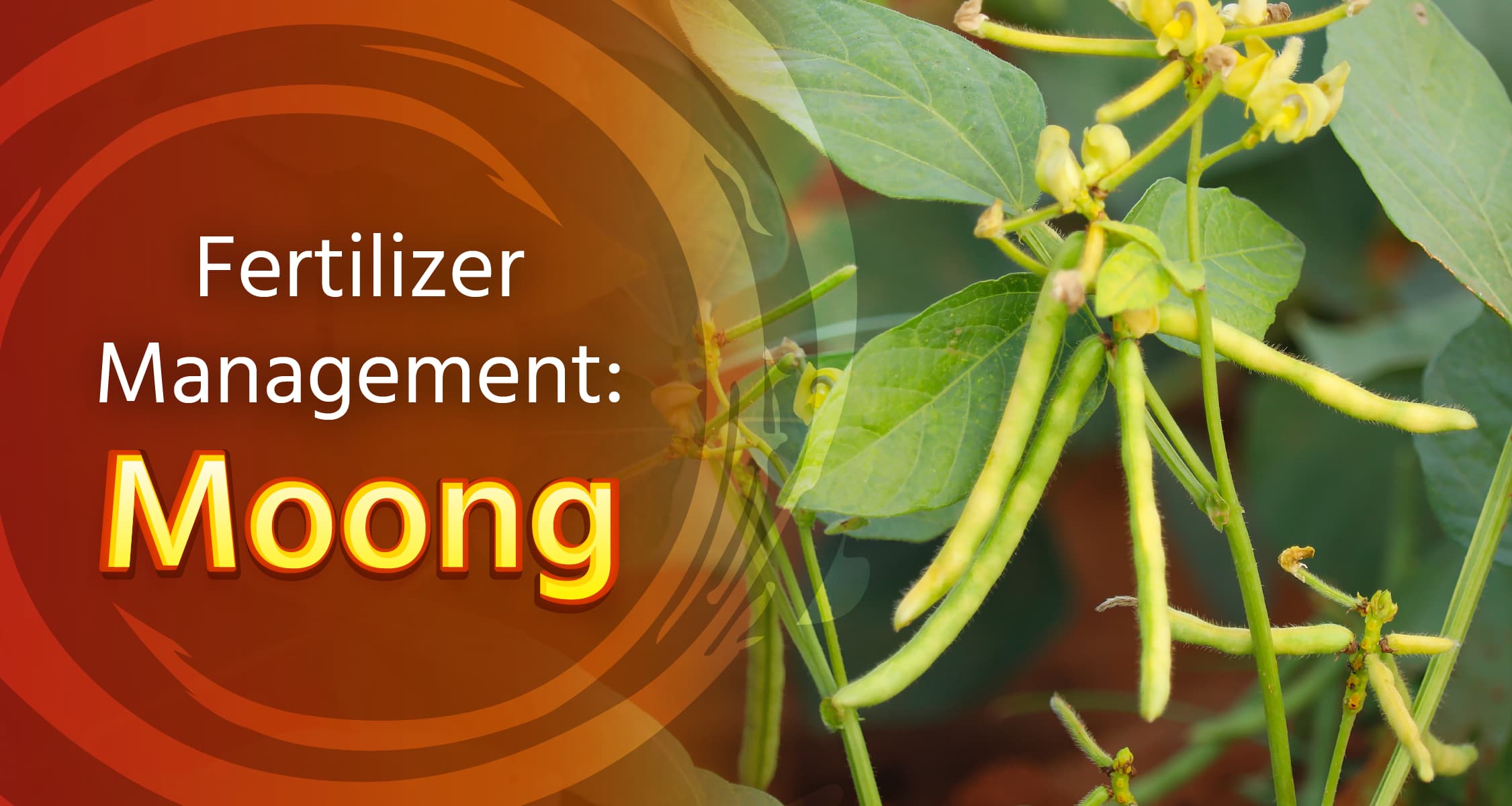Fertilizer Management: Moong

Among leguminous crops, moong cultivation is particularly prominent. Additionally, moong farming plays a significant role in maintaining soil health. The roots of moong crops increase the nitrogen content in the soil. The plants can also be plowed into the soil and used as green manure. Regarding fertilizers used in moong cultivation, the crop requires less nitrogen. For detailed information on fertilizer management in moong cultivation, go through the post carefully.
Benefits of Using Fertilizers in Moong Cultivation
- Nutrient Supply: Fertilizers provide plants with the necessary nutrients in the right amounts, ensuring their healthy growth.
- Increase in Yield and Quality: Proper use of fertilizers can significantly enhance the yield and quality of the moong crop.
- Plant Development: Adequate nutrient supply from fertilizers leads to better plant development.
- Enhanced Disease Resistance: When plants receive the necessary nutrients, they become healthier and more resistant to diseases, reducing the likelihood of pest and disease infestations.
- Stress Resistance: Fertilizers can help moong crops withstand stress caused by drought or excessive rainfall.
- Cost-Effective: Proper use of fertilizers can be cost-effective in the long run, as they improve crop yield and quality, thereby increasing farmers' profits.
- Sustainable Agriculture: Fertilizers can be part of sustainable agricultural practices by maintaining soil fertility and reducing the need for chemical pesticides.
Fertilizer Management While Preparing the Field for Moong Cultivation
When preparing the field for moong cultivation, follow these fertilizer management practices:
Fertilizer Application per acre
- Urea: 8 to 10 kg
- Single Super Phosphate: 24 to 25 kg
- Muriate of Potash: 16 to 18 kg
Before Sowing
- Apply 100 kg of gypsum per acre
At the Time of Sowing
- Mix 10 kg of zinc sulfate per acre into the field
For Better Yield
- Use 4 kg of DeHaat Starter per acre.
If Soil is Deficient in Zinc and Sulfur
- Apply 5 kilograms of zinc sulphate (DeHaat Nutri One Zinc Sulphate Monohydrate) per acre.
Use of Fertilizers at Different Stages of Crop Growth
- At about 20 to 25 days after planting, mix 5 gm of 12:61:00 (DeHaat Nutri One Mono Ammonium Phosphate) per liter of water.
- Add 2-3 ml of DeHaat Boost Master per liter of water and apply.
- At about 30 to 35 days after planting, mix 5 gm of 00:52:34 (DeHaat Nutri One MKP) per liter of water.
Things to Keep in Mind While Using Fertilizers for Crops
- Soil Testing: Before using fertilizers in the field, it is crucial to test the soil for its nutrient content and pH level. This helps farmers determine the appropriate type and amount of fertilizer needed.
- Timing of Use: Fertilizers should be applied at the right time based on the crop and its growth stage. Using fertilizers at the incorrect time can reduce their effectiveness.
- Amount of Fertilizer: Apply fertilizers evenly and at the correct depth to ensure they reach the plant roots. It's important to use the right amount of fertilizer; using too little or too much can negatively affect crop yield and quality.
- Environmental Factors: Environmental factors such as rainfall, temperature, and soil moisture can influence the effectiveness of fertilizers. It's important to consider these factors when applying fertilizers.
- Safety Precautions: Fertilizers contain various chemical elements that can be harmful to human health or cause skin problems upon direct contact. Farmers are advised to wear protective clothing. Safety precautions should be followed to avoid contact with skin and eyes.
Effects of Excessive Use of Fertilizers
- Soil Degradation: Excessive use of fertilizers can lead to soil degradation, reducing its fertility and productivity over time.
- Water Pollution: Fertilizers can leach into groundwater and surface water, causing water pollution. This can harm aquatic life and make water unsafe for human consumption.
- Air Pollution: Fertilizers can release harmful gases into the air, contributing to air pollution and potentially affecting climate change.
- Health Hazards: Excessive use of fertilizers can result in the accumulation of harmful chemicals in crops, posing risks to both human and animal health upon consumption.
- Increased Costs: Continuous excessive use of fertilizers diminishes soil's natural fertility, requiring higher amounts of fertilizers to maintain productivity. This can increase cultivation costs for farmers.
- Loss of Biodiversity: Overuse of fertilizers can reduce biodiversity by harming beneficial microorganisms and insects essential for maintaining soil health.
What fertilizers do you use in the cultivation of moong? Share your answer and experiences in the comments. Follow the 'Krishi Gyan' channel now for interesting and beneficial information on agriculture. Also, don't forget to like and share this post so that it can reach more farmers.
Frequently Asked Questions (FAQs)
Q: What kind of fertilizers are used in moong cultivation?
A: For moong cultivation, farmers should use fertilizers such as cow dung manure, urea, single super phosphate, muriate of potash, etc.
Q: How to increase moong yield?
A: To achieve higher moong yield, farmers should ensure proper land preparation, timely sowing, and adequate irrigation. They should also use high-quality seeds, apply balanced fertilizers, and adopt appropriate pest, disease, and weed management practices. Additionally, intercropping with compatible crops and crop rotation can also help improve moong yield.
Q: How often should moong be irrigated?
A: Moong should be irrigated at regular intervals to maintain adequate soil moisture for proper growth and development. The frequency of irrigation depends on various factors such as soil type, weather conditions, and stages of crop growth. Generally, during vegetative stages, moong should be irrigated every 4-5 days, and during reproductive stages, every 7-10 days.
Please login to continue

Get free advice from a crop doctor
